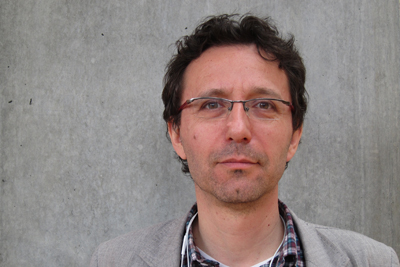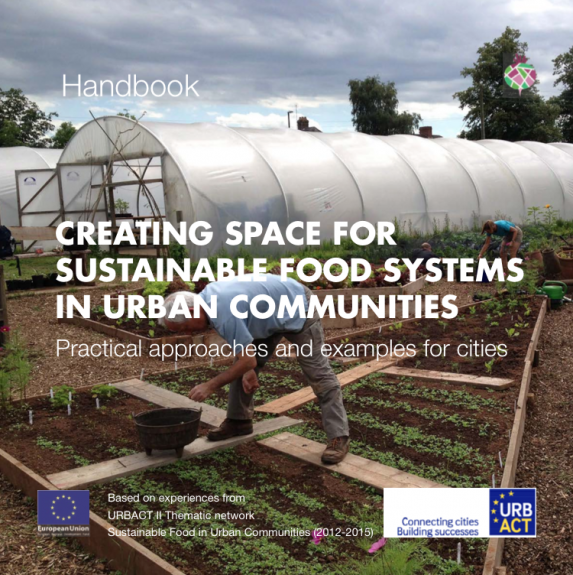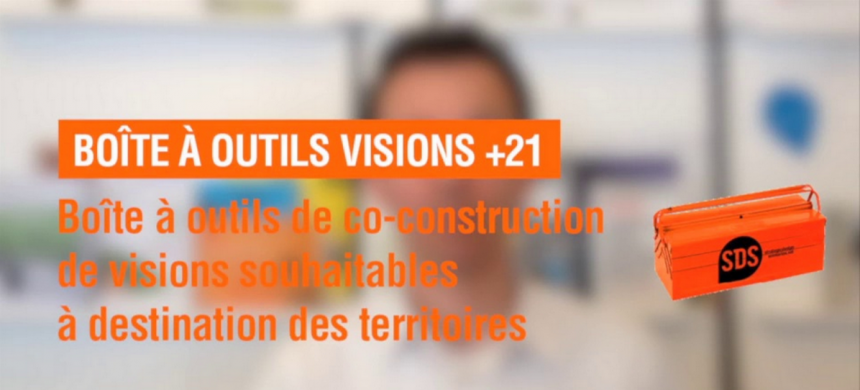
Human Cities Network, today, shares the purpose of the Toolbox which is one of the most important outcomes of the previous Human Cities festival in 2012/ Reclaiming public space. The Toolbox is a collection of tools or toolkits, developed to let people take action in their cities or neighbourhoods. The Toolbox was conceived under the direction of Politecnico di Milano and Cité du Design and coordinated by Strategic Design Scenarios. Human Cities took the opportunity to interview Francois Jégou of Strategic Design Scenarios to find out more about his strategies and developments of his more recent projects. What we found out was remarkably familiar to the purpose and strategy of the Human City Project today.
This Interview is the result of a brief contact over the phone between Louisa Vermoere and Francois Jégou on Friday 5 February.
 Cover of the Handbook, Creacting Space For Sustainable Food Systems In Urban Communities[/caption]
‘URBACT’ is the program depending from the European Commission, that organises networks of cities that are for three years exchanging on their practices and strategy of governance. We have led one of these networks and we are leading a new one at the moment. The first one was about Sustainable Food in Urban Communities (http://www.sustainable-everyday-project.net/urbact-sustainable-food/), so how cities are involved in the topic of sustainable food, which is normally a subject for which they have no official competence at city level. We established a three years exchange in a network between the Brussels- Capital Region (Lead partner), Amersfoort, Athens, Bristol, Gotheburg, Oslo, Ourense, Messina, Lyon, Vaslui, … More info can be found (http://www.strategicdesignscenarios.net/creating-space-for-sustainable-food-systems-in-urban-communities). The booklet is a publication of the exchanges between the different cities. The toolbox fostered the exchange and it elaborates on a selection of good practices.
We are now in the beginning of establishing a new network of European Cities for the next two years on temporary use of vacant urban spaces and placemaking. It focuses involvement of all the stakeholders in the city to reuse back-end spaces and empty buildings. This back-end real estate is normally seen as a problem but when you take these spaces as an opportunity to develop cultural, social projects, they could boost the development. As a beginning we will publish a first book of 100 pages of 10 cities: Ghent is the Lead partner and the network includes Helsinki, Nantes, Poznan, Athens, Ostrava, Cluj, Amersfoort, Bremen and Riga. This book will elaborate on temporary use activities in these cities and on the six main topics on which we will work (in March 2016 in our online library at http://www.strategicdesignscenarios.net/category/library-menu). Although it involves more the governance level, it is very much related to what Human Cities I & II did.
Cover of the Handbook, Creacting Space For Sustainable Food Systems In Urban Communities[/caption]
‘URBACT’ is the program depending from the European Commission, that organises networks of cities that are for three years exchanging on their practices and strategy of governance. We have led one of these networks and we are leading a new one at the moment. The first one was about Sustainable Food in Urban Communities (http://www.sustainable-everyday-project.net/urbact-sustainable-food/), so how cities are involved in the topic of sustainable food, which is normally a subject for which they have no official competence at city level. We established a three years exchange in a network between the Brussels- Capital Region (Lead partner), Amersfoort, Athens, Bristol, Gotheburg, Oslo, Ourense, Messina, Lyon, Vaslui, … More info can be found (http://www.strategicdesignscenarios.net/creating-space-for-sustainable-food-systems-in-urban-communities). The booklet is a publication of the exchanges between the different cities. The toolbox fostered the exchange and it elaborates on a selection of good practices.
We are now in the beginning of establishing a new network of European Cities for the next two years on temporary use of vacant urban spaces and placemaking. It focuses involvement of all the stakeholders in the city to reuse back-end spaces and empty buildings. This back-end real estate is normally seen as a problem but when you take these spaces as an opportunity to develop cultural, social projects, they could boost the development. As a beginning we will publish a first book of 100 pages of 10 cities: Ghent is the Lead partner and the network includes Helsinki, Nantes, Poznan, Athens, Ostrava, Cluj, Amersfoort, Bremen and Riga. This book will elaborate on temporary use activities in these cities and on the six main topics on which we will work (in March 2016 in our online library at http://www.strategicdesignscenarios.net/category/library-menu). Although it involves more the governance level, it is very much related to what Human Cities I & II did.
 As a second example we co-developped on a Toolbox for Agenda 21; a project about territorial sustainable development led by the local authorities. It is active in Belgium, France, Canada, etc. It is a bottom-up stakeholder process with an action plan. We have worked for the redesign of Agenda 21 national policies for the ministry of environment in France. The issue that needed to be solved is that local authorities want to support sustainable projects but lack a vision to do so. They have a list of actions and they are randomly doing things but they don’t have a (clear) vision on where they want to go. In order to develop that vision we ask to the cities we worked with in France; why and wherefore you want to develop? Can you describe your vision? How do you see the small village, town, city, local territory in 10-20 or 40 years. To facilitate these answers we developed a toolbox called Vision+21 which engages in two days about 40 stakeholders: elected representatives, civil servants, citizens, industrialists, servants of the local territory to build a scenario. In the end the result is a small movie showing a collectively build vision of their territory (http://www.sustainable-everyday-project.net/boite-a-outils-visions-21/).
As a second example we co-developped on a Toolbox for Agenda 21; a project about territorial sustainable development led by the local authorities. It is active in Belgium, France, Canada, etc. It is a bottom-up stakeholder process with an action plan. We have worked for the redesign of Agenda 21 national policies for the ministry of environment in France. The issue that needed to be solved is that local authorities want to support sustainable projects but lack a vision to do so. They have a list of actions and they are randomly doing things but they don’t have a (clear) vision on where they want to go. In order to develop that vision we ask to the cities we worked with in France; why and wherefore you want to develop? Can you describe your vision? How do you see the small village, town, city, local territory in 10-20 or 40 years. To facilitate these answers we developed a toolbox called Vision+21 which engages in two days about 40 stakeholders: elected representatives, civil servants, citizens, industrialists, servants of the local territory to build a scenario. In the end the result is a small movie showing a collectively build vision of their territory (http://www.sustainable-everyday-project.net/boite-a-outils-visions-21/).